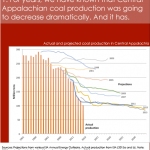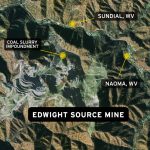
A Tale of Two Families By Cat McCue At the top of Sinking Creek Mountain in western Virginia, where Craig, Giles and Montgomery counties meet, sits a 50-acre parcel of land with views in all directions. To Judy and Steve…

A Tale of Two Families By Cat McCue At the top of Sinking Creek Mountain in western Virginia, where Craig, Giles and Montgomery counties meet, sits a 50-acre parcel of land with views in all directions. To Judy and Steve…
In Fayette County, W.Va., residents speaking up against natural gas drilling wastewater spurred a county-wide ban on the use, storage or disposal of any oil or gas waste.
Contact: Ben Luckett, Staff Attorney, Appalachian Mountain Advocates, 304-645-0125 Hannah Wiegard, Appalachian Voices, hannah@appvoices.org, 804-536-5598 Drew Gallagher, Chesapeake Climate Action Network, drew@chesapeakeclimate.org Kirk Bowers, Virginia Chapter of the Sierra Club, kirk.bowers@sierraclub.org Dominion Energy announced plans today to re-route the proposed…
Contact: Ben Luckett, Appalachian Mountain Advocates, 304-645-0125, bluckett@appalmad.org Kate Rooth, Appalachian Voices, 804-536-5598, kate@appvoices.org Anne Havemann, Chesapeake Climate Action Network, 240-396-1984, anne@chesapeakeclimate.org Kirk Bowers, Virginia Chapter, Sierra Club, 434-296-8673, kirk.bowers@sierraclub.org On behalf of conservation groups in Virginia and West Virginia,…

Witnessing the one-sidedness of coal bankruptcies in Appalachia and their aftershocks goes to show who has a voice and whose voices the system values. Take Alpha Natural Resources, which recently received approval to pay its executives millions in bonuses despite not having made a profit since 2011.

After the dismal year coal had in 2015, more hard times for the industry are ahead. Nowhere is the struggle more real than in Central Appalachia. A new white paper from Downstream Strategies tells the story of Appalachian coal over the past few decades in five simple charts.

From The Appalachian Voice: West Virginia communities are still dealing with problems related to mountaintop removal coal mining. Toxic coal slurry impoundments, increased blasting and diminished water quality are among the challenges facing such communities at risk.

Jill Averitt lives in Central Virginia with her extended family on a patch of land where collectively they are raising seven children, lots of vegetables–and in the past year, a ruckus over Dominion’s plans to run a massive fracked gas pipeline right through that land. She created the “Prayers Not Pipelines” project as a powerful way to connect with her neighbors, and to protect her home and community.

Today the U.S. Congress passed a spending bill that covers expenditures for agencies including the U.S. Environmental Protection Agency, Department of the Interior, Department of Labor, and the Appalachian Regional Commission. The spending bill is a big deal for Appalachian Voices and our work. And honestly, it looks pretty darn good.

West Virginia communities, including Naoma and Sundial are still dealing with problems related to mountaintop removal coal mining. Toxic coal slurry impoundments, increased blasting and diminished water quality are among the challenges facing such communities at risk.